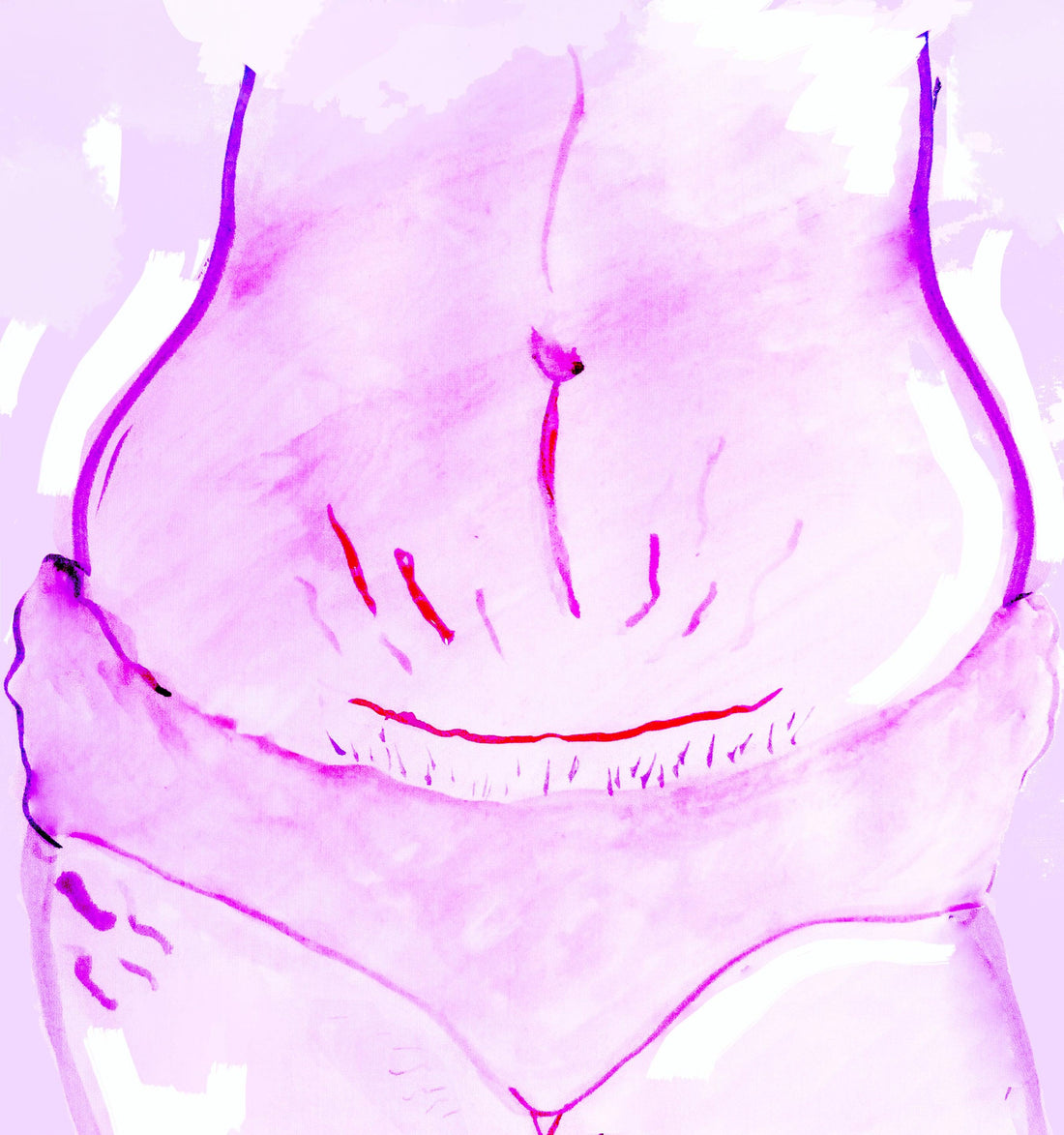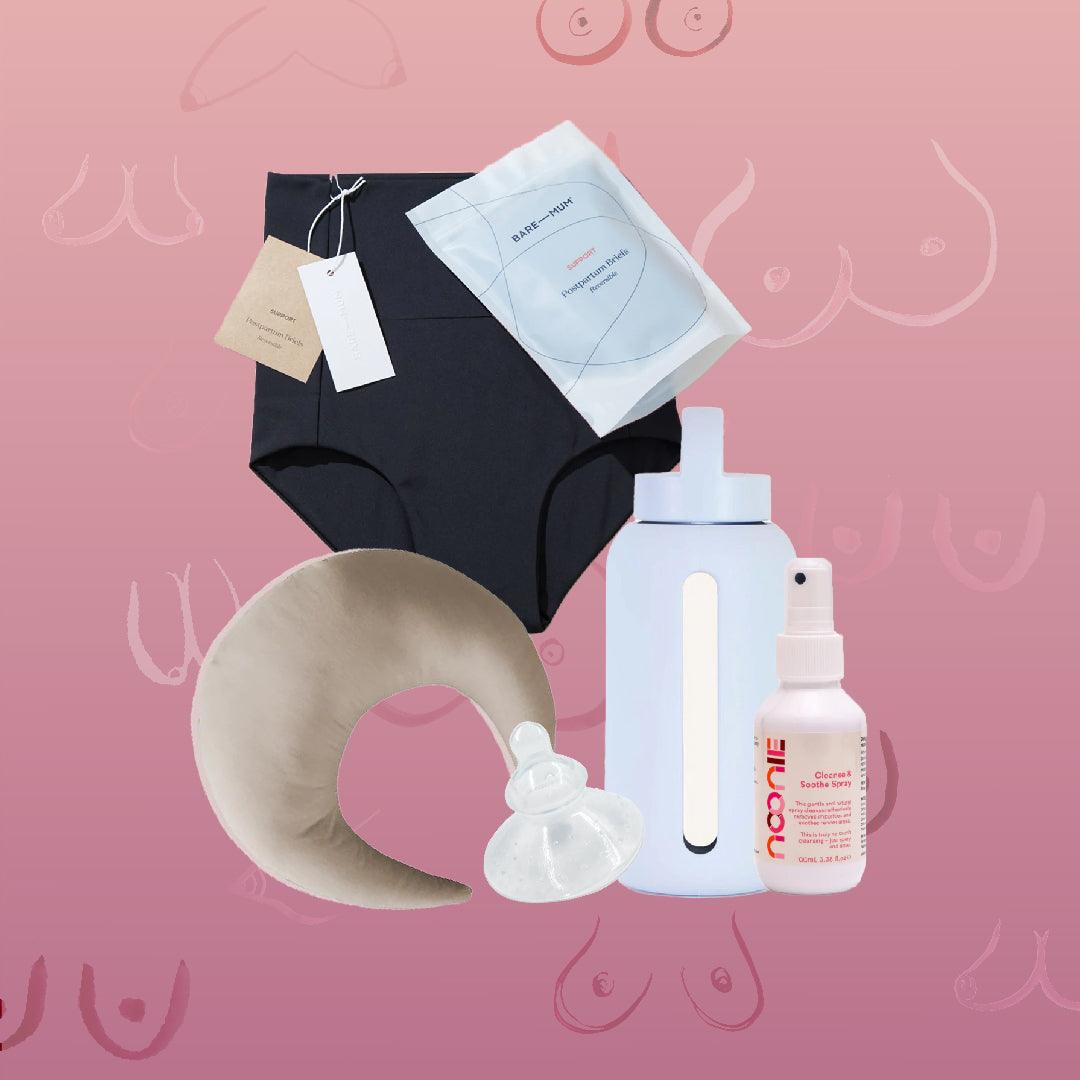Here's what I wish I knew.
I was unprepared for two things when my baby arrived. One, the overwhelming love I felt for my son. Two, the state of my body, and, to be honest, my mind. I had a loose childbirth plan. I’d spoken to enough mums to know they’re essentially science fiction, but if things got wild, I wanted badly to be kept awake for the birth. Surely, that was a safe ask, right? Technically, it was, because I didn’t get knocked out until a few seconds after they pulled my baby Earth-side. Emergency Caesarean (with a lot of complications). It happens.
The intense birth had left me pretty beat up. I’d lost a lot of blood. My abdomen had been cut through in a hurry. I’d had a lot of different drugs. My uterus was pulsing as it started retracting and bleeding. My boobs were deflated, waiting for my body to be strong enough to start producing milk. And laying in my hospital bed, I couldn’t sit up or stand, and not just because of the number of machines and tubes that were plugged into me.
It’s hard to focus and be present in those first few days in the hospital. Some things are crystal clear: my husband helping me to have that first shower. My mum’s face when I told her the name of her first grandchild. Being terrified to do a poo. My first pangs of worry for my little human. Watching the sunrise and experiencing what it is to be bone tired. The rest feels blurry, and I think much of that, was because I was in shock. I wanted to be in my blissful baby bubble, and I was, he was healthy and I was so in love, but I was knocked by what I looked and felt like. One in five women experience postnatal anxiety or depression. But that feeling isn’t exclusive, you can feel the highest highs and lowest lows at the same time.
Once at home, things got easier and harder. At night I’d lay on my side holding my belly, worrying that my stitches would come undone and my insides would fall out. I couldn’t bend down, so was constantly asking my partner to pick things up. Breastfeeding was a learning curve. I was changing nappies, his and mine. Dealing with a limited range of movement. Trying to keep track of feeding, sleep and medication schedules, and how many layers would keep him at the perfect temperature. I didn’t want my partner to leave my side, so no one was sleeping. I finally called my mum and asked her to fly back and come help us. She’d take care of us while we learnt to take care of the baby.
It sounds intense, because it was. But when I went to my first mothers group a month or so later, I realised my experience with childbirth was no more intense than anyone else’s. Recovery from childbirth is not straightforward, even in ideal circumstances. There’s a whole spectrum of things that can happen. The weeks after birth, yes, you need to learn how to be a parent, but you also need to focus on your recovery. It needs to be prioritised. It’s not a matter of needing some “me time”, it’s your body stitching itself back together, transitioning from carrying a baby to providing food for it, and your brain adjusting to this new life and all the decisions you need to make in it. It’s not the cute cuddly side of having babies, it’s raw and real and, yeah, a bit scary, which is probably why it’s often omitted from the conversation. But being aware of it and prepared for it before it happens, while you’re in a more functional state, really helps. So, I'm talking about it. Here is a run down of some of the most common postnatal occurrences that you should know about.
Your first poo is terrifying
Your first bowel movement after childbirth will be painful/scary based on the level of trauma in your birth. But it must be done. Most women will be prescribed stool softeners to ease the process. If you had a vaginal birth, you be worried to put too much strain on a recovering perineum. It might be a few days, but again, it must be done. The softeners will help.
If you had a Caesarean, the first bowel movement indicates that everything is still working after your surgery. Which is a huge surgery. Again, this may take a few days, but the nurses and doctors will continue to ask if you’ve done it until you have.
Definitely buy the big undies
So there's no pressure on anything, and room to house all the things that need to go in your pants during childbirth recovery. Everyone bleeds after birth, heavily for about 10 days and spotting for about 6 weeks, even if you had a Caesarean. So, you will also be wearing big, cloud-like pads to cushion the area and collect the blood or buy undies that collect it for you, like Modibodi Postpartum Briefs. The bleeding is from the uterus as it contracts and sheds its lining. It even has a special name, lochia. Lochia has clots, which can be shocking. Anything bigger than your fist, contact the nurse. In the first few days it’s normal to soak a pad an hour and it becomes less as time goes on. If it ramps back up again, contact the hospital.
Your vagina is going to need some support
Vaginal tearing is very common, almost every woman will experience some tearing with a vaginal birth. It usually occurs in the perineum which is the area between your vaginal and anus, but tears towards the clitoris can also happen. The severity of a tear is graded from first to fourth. First degree are minor tears that are left to heal on their own. Second degree mean the perineal muscle is more involved and you may be stitched. Both third and mean the tearing has extended from the vagina to the anus, but the tear is deeper in the fourth. Both require stitches that will dissolve on their own in a few weeks. This stitching happens immediately after the birth, and if you haven’t had an epidural the doctor will use a local anaesthetic. Either way, you won’t feel it.
Recovery from vaginal tearing can take a while. After birth you can expect discomfort, swelling and bleeding regardless, but a tear means more of this. You may be prescribed pain medication and a stool softener so you don’t need to strain when you do a number two. Body Ice or Bare Mum Cool Inserts are helpful here. You can wear an ice pack in your underpants for up to 20 minutes which will help reduce swelling. You can use a Bare Mum Ergonomic Perineal Wash Bottle to spritz lukewarm water onto the perineal area, cleansing without pressure. The hospital will give you a squeezy bottle but it's nowhere near as efficient or easy to use. Tearing can also make peeing painful, so squeezing water onto your vaginal area while you pee can help because it dilutes the wee to make it less stingy. You may also be given a sitz bath: a small plastic tub that fits over your toilet. Fill it with lukewarm water and sit in it for a few minutes to clean your skin. Bare Mum Postpartum Sitz Bath are a combination of epsom salts and natural herbs that give instant relief to tender, swollen bits.
Once healed, your vagina will be different. Not bad, but different, and it will take time to get used to it and want to do activities, like sex. Give yourself time.
Your body will still look pregnant
When my mum gave birth to her first child (me) in the late ‘80s, she packed Country Road jodhpurs as her going home outfit. She assumed, with the baby out, her body would go back to its former shaper before she’d left the hospital. Not true. In the days after birth, you still look pregnant. Less and less everyday, but still pregnant. I have friends who refer to this as “jelly belly”. It feels strange, and can be a bit disconcerting to see in the mirror. But it will keep changing, it takes time. After your belly has gone down, there will be floppy skin and for many, a little stomach pouch that no amount of exercise will affect. And that’s OK.
Caesarean recovery will limit your movement and ability
Depending on how your C-section came to be, you may experience some of the aftermath of vaginal births i.e. if your C-section came after hours of labour. Caesareans comes with its own set of lingering consequences related to undergoing major abdominal surgery. Basically, you can’t use your abs without pain. This affects picking things up, getting out of bed, walking, climbing stairs, sitting. So, everything. Eventually things will heal and moving will get easier, but in general it takes longer than a vaginal birth. It's also important you take care of you belly wound. You also won’t be able to drive for six weeks.
Your emotions will be up and down
It is very common to experience postpartum depression or anxiety. In the first few days or weeks after childbirth you will feel a rollercoaster of emotions. You will cry, often and hard. It’s called the “baby blues”, and is due to your hormones changing dramatically. It settles in a few weeks, but postnatal depression or anxiety isn’t always so immediate. It can set in during pregnancy or months after childbirth, in fact, maternal depression is highest when your first child is four. At your six week appointment you will be tested for postnatal depression, with the Edinburgh Postnatal Depression Scale. Mild depression is treated first with sleep. Lack of sleep can be a major contributor to mild depression in new parents, dads too. Exhaustion makes it hard to enjoy things even without a newborn, so this isn’t surprising. More severe depressions will be treated with therapy and medication.
Asking for help is smart
“Smart girl”. That’s what my beautiful friend and mum mentor texted me when I told her I’d asked my mum to come and stay to help out. “Asking for help is the smartest thing you can do honey. You’re no good to anyone if you’re not good yourself. That’s exactly how you make sure you can do what you need to for that baby.” I had felt like I’d failed by asking, and that I was breaking that special time that I had so fiercely wanted to be just me, my husband and our newborn. My husband also felt like he’d failed. But hearing this changed everything. It was something to be proud of. Identifying the issue, a solution and asking for it. The people in your life who love want to help, but they can’t always know exactly what you want. So tell them. Ask for what you need, whether that’s someone to organise your meals for the week (we barely ate the first few days at home with the baby), or someone to take your older kids to the park for a few hours. If a friend comes to visit you, and asks if they can do anything before they leave, tell them. Housework included. If it’s bothering you that the floors need to be vacuumed or there are dishes in the sink. Ask them to do it.




















